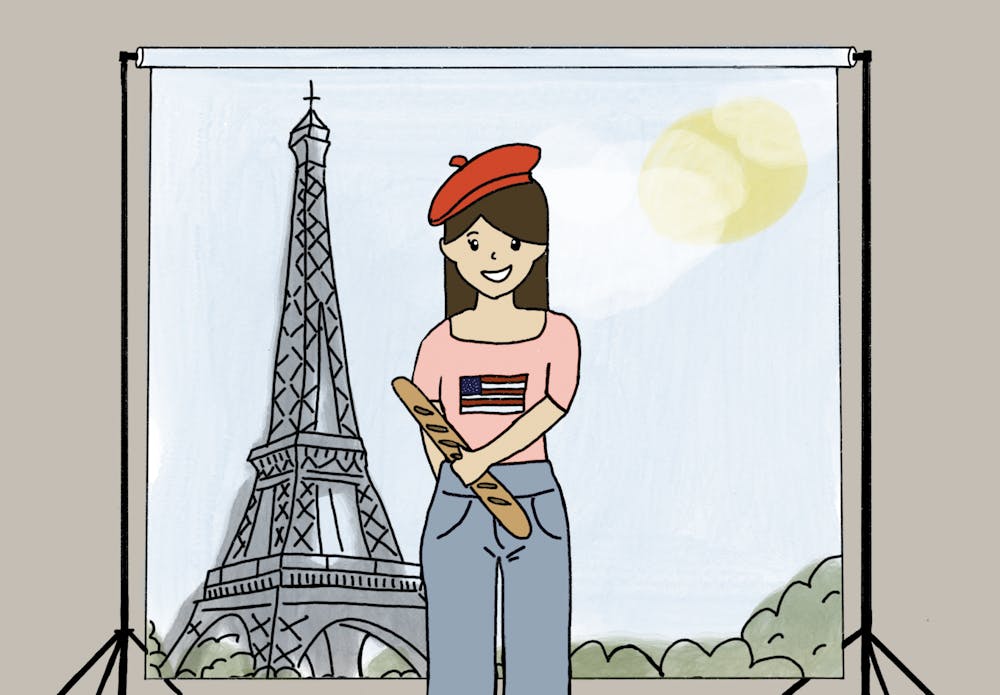At the beginning of spring break, I flew out to France as the classic American tourist who didn’t speak the language. After one week, I returned to Charlottesville as a seasoned traveler who could navigate conversations in French with ease and charisma. Here are my secrets.
First, I memorized the basic French phrases that I would need in everyday situations. I have listed the most important ones below.
- “Please tie my shoes.”
- “May I borrow your passport?”
- “I would prefer my sandwich without bread.”
- “Do you even know who I am?”
- “Sorry sir, I couldn’t find a bathroom in time.”
- “Who do you think you are?”
- “I would like to purchase a house today.”
- “If you strike me down, I shall become more powerful than you could possibly imagine.”
Then, I focused on how to pronounce words in French. After a Youtube video had me gargling water to learn the French “r,” I discovered the key to pronunciation — give up immediately. I needed to stop changing myself for others.
I became quite talented at smiling and nodding. Locals often complimented my technique. They gave me compliments such as “pourquoi souriez-vous,” which likely means, “how did you become so talented?”
Google Translate is a popular tool among language learners, but I do not trust it. I came up with a different tactic. Whenever I could not say something in French, I looked down at the sidewalk and fidgeted, muttering, “Je suis timide.”
My ultimate test of fluency happened on the plane home from Paris. It was the culmination of all my hard work.
The flight attendants wiggled through the aisles with their squeaky food carts. I removed my headphones when the cart was about five rows behind me — rookie mistake. I ended up waiting for another twenty minutes. As I sat there — my ears AirPod-less for the first time in years — I listened to the flight attendant listing the two meal choices. Again and again, he would push his cart forward and shout to each row, “Bonjour madame, would you like the chicken or the pasta?” If the passengers seemed especially touristy, he would say, “Hello m’lady, would you like the chicken or the pasta?”
When my turn finally came, my heart was racing. The flight attendant pushed his cart beside me and said, “Bonjour mademoiselle, parlez-vous français?” Something deep in my soul spoke to me in that moment. It told me to fake it until I made it. “Oui,” I replied.
“How hard could this conversation be,” I thought. My foolproof plan was to listen carefully to how he pronounced “pasta” in French and then repeat it as my answer.
The flight attendant asked me the big question — “Voulez-vous du poulet ou l'option végétarienne?”
Oh no. I was severely unprepared. I was not ready to stumble my way through pronouncing “l'option végétarienne” correctly. My cover was about to be blown. “Pasta,” I blurted out.
Phew! I had passed the ultimate test of fluency.
Or at least I thought I did. I now realize that the word for pasta in French is “pâtes” instead. It makes sense why the flight attendant started speaking to me in English after that.
As I reflect upon the woman I was one week ago versus the polyglot I am today, I see that “fluency” does not mean perfection. It means doing the bare minimum. By that definition — and I do not mean to brag — I am fluent in nearly everything. Stay tuned for your favorite polyglot’s next triumph, where I’ll hustle for a full hour to become fluent in Mandarin.







